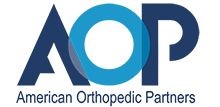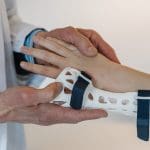
WHITE PAPER: Outpatient Migration – New Opportunities for Joint Ventures
Theodore Schlegel, MD
President / Chief Medical Officer
American Orthopedic Partners
Background. Major orthopedic procedures, like hip and knee replacements, are increasingly migrating from hospital inpatient to hospital outpatient settings, or to ambulatory surgery centers (ASCs). The shift began almost 20 years ago and has accelerated significantly in the last five years due to:
- Increased demand for orthopedic procedures, especially total joint replacements desired by baby boomers, which outpaces hospitals’ inpatient OR capacity to deliver this care
- Clinical advances including minimally invasive surgical techniques, remote patient monitoring with wearable sensors, anesthesia post operative pain control, the ready availability of telehealth, and real-time patient status reporting
- Strong research findings which establish that orthopedic surgery performed in an ASC is safe and effective for appropriate patients, with outcomes and complication rates equal to or better than inpatient
- Improved patient satisfaction with the entire experience, including reduced cost sharing
- Improved physician satisfaction as surgeons have considerably more control over care delivered in an ASC versus a hospital
- Lower costs: surgical procedures performed in ASCs save billions of dollars per year currently and insurers are eager to establish the ASC as the preferred site of service for many orthopedic procedures1. Payers are beginning to adopt policies whereby they will pay only for the least costly setting, appropriate to the type of surgery and patient risk characteristics.
Over the past several years, CMS has removed close to 300 MSK procedures from the inpatient-only list2. For appropriate patients, most total joints are now outpatient procedures. Nevertheless, many inpatient-only procedures remain, for example, spine-surgery outpatient migration is still in its early stages.
There is also a shift underway to office-based surgery. Already hand surgery is regularly performed in the office. Careful patient selection is critical. Hand cases— procedures that include carpal tunnel and trigger finger release, superficial soft tissue mass removals, volar wrist ganglion, nailbed injuries, and other procedures that don’t cause significant bleeding or require metal implants — are performed under local anesthesia. Contracting with anesthesiologists for office-based surgery is also being done.
This transition to outpatient settings and the office continues the shift toward value-based care and population health, as payers continue to seek lower costs coupled with improved outcomes.
New Opportunities. Orthopedic surgery practices need to consider different reimbursement models to participate in the benefits of this shift equitably and fully. Equitably because as surgeons we accept more financial liability in an ASC, especially if we are owners3. Fully because we have as much right to the financial benefits of lowering facility costs as any other party to the transaction (the hospital, the payer, and the patient); surgeons are the skill players, providing the expert care, assuring high quality, controlling costs, and accepting the concomitant liability.
While we value ASC ownership, we prefer, where possible, to share ownership with our main hospitals. By sharing ownership of an ASC with a hospital, we help ameliorate its loss of revenues as care migrates outward, in return for a strategically beneficial affiliation. Stable, reliable hospital relationships are highly desirable and help to assure long-term success for orthopedic practices.
Besides co-owning and operating ASCs, orthopedist/hospital joint ventures can establish orthopedic urgent care centers, guarantee orthopedic ED coverage, provide a strong occupational medicine program, strengthen relationships with payers, and share risk in managed care payer contracts (among other initiatives). High-risk patients will always need access to high-quality hospitals.
Who benefits financially when care is moved to an appropriate, lower-cost setting? Under fee-for-service reimbursement (the norm in most orthopedic practices today) it’s mostly the payors, and to a lesser extent the patients with their reduced cost-sharing burden. Reimbursement models that include some level of financial risk (like bundling procedures or capitation) are required for orthopedic surgeons to participate in the benefits of the outpatient migration cost savings. In many markets, good opportunities are available to work directly with payers, including large employers, together with forward-thinking hospitals.
Final Thoughts. We agree with what our colleagues are saying about the transition [quotes below are from Beckers Spine: March 3, 2023]:
- …this [outpatient migration] will allow patients to shop around for the best experience, technique, and technology advancements when selecting a center for surgery and then control their recovery environment at home. James Abbott, MD. Orthopedic Surgeon at Best Surgery & Therapies (Cincinnati, OH)
- …the shift to outpatient care has appropriately reestablished a balance of powers. Before, the pendulum swung drastically in the favor of payers and hospitals/health systems. Now, orthopedic surgeons have a greater impact, more administrative influence, and autonomy in patient care all while optimizing their entrepreneurship. Emeka Nwodim, MD, Orthopedic Surgeon at the Centers for Advanced Orthopaedics (Bethesda, MD)
Outpatient migration provides opportunities for orthopedists to provide safer and better care. This is not a time to be passive; this is not a trend to sit out. The opportunities have never been better for orthopedic groups to become stronger, more capable, and important players in the healthcare space.
——————————–
1 A recent analysis demonstrated a 13.7% decrease in cost for total knee and 13.9% for total hip replacements done in an ASC compared to a hospital inpatient location. In addition, patient satisfaction and outcomes were improved, and complications decreased in the ASC setting (Journal of Arthroplasty, various articles)
2HCPCS [Healthcare Common Procedure Coding System] and CPT [Current Procedural Terminology] codes that are only paid by CMS as inpatient procedures.
3 To control and manage the means of our production we need to own our ASCs.
——————————–
References
Beckers Spine: What the shift to outpatient care means for the orthopedic industry; Riz Hatton – Friday, March 17th, 2023 https://www.beckersspine.com/orthopedic/56515-what-the-shift-to-outpatient-care-means-for-theorthopedicindustry.
American Surgery Center Association: The Advancing Surgical Care Podcast, The Migration of Surgical Procedures from Inpatient to Outpatient. March 16, 2023 https://www.ascassociation.org/asca/resourcecenter/podcast/podcast-episode-inpatient-to-outpatient-migration
AORN, Outpatient Surgery Magazine: Trend to Watch: The Rise of Office-Based Surgery; 6/5/2023 [AORN is the Association of perioperative Registered Nurses] https://www.aorn.org/outpatient-surgery/article/trend-to-watch-the-rise-of-office-based-surgery
Van Horne J, Van Horne A, Liao N, Romo-LeTourneau V. Migration of Hospital Total Hip and Knee Arthroplasty Procedures to an Ambulatory Surgery Center Setting and Postsurgical Opioid Use: A Private Practice Experience. Am Health Drug Benefits. 2022 Mar;15(1):21-29. PMID: 35586615; PMCID: PMC9038002. https://www.ncbi.nlm.nih.gov/pmc/articles/PMC9038002/
Jeff Almand, Trevor Pickering, Doug Parsell, Ben Stronach, Robert Carlisle, Louis McIntyre, The successful migration of total joint arthroplasty from the hospital inpatient to outpatient ASC setting, The Knee, Volume 34, 2022, Pages 17-23, ISSN 0968-0160 https://www.sciencedirect.com/science/article/abs/pii/S0968016021002702













Sorry, the comment form is closed at this time.